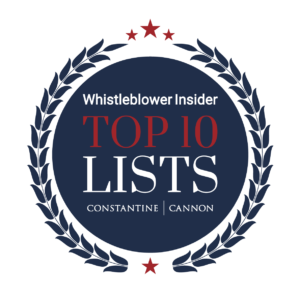Top Ten Federal Financial Fraud Recoveries of 2022

Federal enforcement of financial fraud takes many forms. This year, thanks to positive developments in the world of money-laundering enforcement, we have expanded our Top Ten Lists related to federal financial fraud. In addition to documenting SEC and CFTC enforcement actions, FCPA enforcement, and money-laundering enforcement, the following list focuses on financial fraud in other realms.
The Consumer Financial Protection Bureau (“CFPB”) had an active enforcement year. Several of the largest financial institutions in the United States were the target of CFPB enforcement actions. Wells Fargo, perennially on the naughty list, appears again this year, in actions by both the CFPB and the Department of Labor. Bank of America, the nation’s second largest bank, was also the subject of one of CPFB’s largest enforcement actions of 2022, involving allegations that the bank slammed the coffers shut for legitimate unemployment insurance claimants during the pandemic.
Many of the other notable enforcement actions on this list involve scams and wrongful conduct that disproportionately affects individuals with low incomes and low net worth, and employees who are unable to avoid the wrongful conduct of their employers. In a milestone case against a non-mortgage lender, the Dept. of Justice and the CFPB worked together to enforce against Trident Mortgage Company for systematically discriminating against neighborhoods and homeowners of color in and around Philadelphia.
We salute these agencies for looking out for the underdog and hope to see even more rigorous enforcement in 2023.
- Wells Fargo – $3.7 billion. The CFPB imposed a $1.7 billion penalty and ordered Wells Fargo to pay over $2 billion in restitution to customers for the bank’s wrongdoing related to auto loans, mortgages, and illegal surprise overdraft fees. These failures harmed over 16 million customers. Wells Fargo wrongfully denied loan modifications to mortgage customers, some of whom lost their homes in improper foreclosures. The bank also misapplied car loan payments from customers and charged incorrect fees on auto loans. In addition, Wells Fargo charged surprise overdraft fees to customers with sufficient funds in their accounts and froze customer accounts for “suspicious deposits” when there was no need to do so. The CFPB highlighted that Wells Fargo is a “repeat offender,” whose management knew about many of these problems for years before fixing them. CFPB Director Rohit Chopra summed it up, “Wells Fargo’s rinse-repeat cycle of violating the law has harmed millions of American families.”
- Perfectus – $1.83 billion. A federal court ordered six companies based in Southern California to pay $1.83 billion in restitution for defrauding U.S. Customs and Border Protection and their investors. The scheme involved both avoiding customs payments and misleading investors about the profitability of a Chinese company. The companies conspired to fake the sales of aluminum imported from China and to avoid American anti-dumping and countervailing duties. Huge quantities of aluminum were exported from China to the U.S. as “pallets.” However, they were never intended to be used as pallets and were instead stockpiled in a warehouse the defendants owned and then melted down to be remade in saleable forms. The fraud allowed Chinese billionaire Zhongtian Liu to inflate the value of his company with fake sales to the U.S.
- Bank of America – $225 million. Bank of America has been fined $100 million by the CFPB and $125 million by the Office of the Comptroller of Currency for massive failures in carrying out its contracts with 12 states to provide unemployment payments and other public benefits during the pandemic. Bank of America was responsible for administering pre-paid debit cards loaded with benefit payments. In response to widespread fraud on the unemployment insurance system during the pandemic, Bank of America chose to freeze accounts and failed to do reasonable fraud investigations. When Americans were desperate for access to income to survive the global crisis, Bank of America instituted overly sensitive automated fraud detection policies on its debit cards. The government says the bank knew or should have known these policies would freeze accounts for legitimate customers. To add insult to injury, the bank made it nearly impossible for customers to contact the bank to get their accounts unfrozen. In addition to the fines, the order requires Bank of America to pay affected customers a lump sum payment, to be determined, and allows for individual review of customer eligibility for additional redress payments.
- Regions Bank – $191 million. The CFPB ordered Alabama-based bank Regions Bank to pay $50 million to the CFPB’s victims relief fund and to refund customers at least $141 million for charging customers surprise overdraft fees. Regions Bank, which has branches and ATMs in 16 states, made it nearly impossible for customers to avoid overdraft fees by showing customers a positive balance at the time of their transaction. These types of overdrafts are called authorized positive, settle negative transactions. In these types of overdrafts, banks have opaque and difficult to understand procedures for settling accounts, so even vigilant customers could not know realize a transaction would trigger an overdraft. The CFPB has been warning against this banking practice for years. Regions Bank’s fraud was particularly egregious, because the CFPB had previously disciplined the bank for overdraft violations in 2015. What’s more, bank executives knew about the fraud for years before they put a stop to it. They decided to wait until they found a way to make up the revenue that would be lost, since overdraft fees made up nearly 18% of the bank’s non-interest income.
- Wells Fargo – $145 million. Wells Fargo’s second spot on this list arises from an action by the federal Department of Labor, whose Employee Benefits Security Administration investigated Wells Fargo’s practices with respect to the 401(k) plan offered to its employees. The EBSA found that Wells Fargo and the plan’s trustee caused the plan to overpay for Wells Fargo stock that was purchased for the plan. The preferred shares were specifically designed for purchase by the bank’s 401(k) plan, and converted to a set value when allocated to plan participants. EBSA further found that Wells used dividends on the shares to partially finance the purchases. The settlement consists of a $13.2 million penalty and more than $131.8 million in restitution to plan participants.
- Poultry Processing Settlement – $84 million. In a proposed consent decree with the Department of Justice, poultry processors Cargill, Sanderson Farms, and Wayne Farms, and data broker Webber, Meng, Sahl and Company (WMS), agreed to end practices of sharing competitively-sensitive information about plant worker wages and benefits. The processors committed to pay over $84 million in restitution to plant workers who were harmed by the information exchange conspiracy. In addition, the agreement with Sanderson and Wayne Farms requires changes in their agreements with growers.
- U.S. Bank – $37.5 million. The CFPB imposed a $37.5 million penalty on U.S. Bank and required restitution to customers for illegally obtaining customers’ credit reports and opening unauthorized new accounts in their names. U.S. Bank’s internal policies created a breeding ground for fraud by pressuring employees to meet sales goals and providing incentive pay for selling bank products. Customers ended up with unauthorized credit cards and bank accounts that sometimes incurred fees or harmed their credit scores. U.S. Bank abused its customers’ right to control their own personal information and left customers to spend time and effort closing unwanted accounts.
- AT&T – $23 million. AT&T Illinois agreed to pay $23 million to resolve a federal criminal investigation into payments made by the company to influence state legislation sought by AT&T to advance its efforts to end an obligation to provide landline telephone service in the state. The payment – $22, 500 – was made by AT&T Illinois to an ally of former Illinois Speaker of the House Michael Madigan. As part of deferred prosecution agreement, AT&T Illinois admitted that the payment to the Madigan ally was made in exchange for Madigan’s vote and influence over a bill.
- Trident Mortgage Company – $22 million. Trident Mortgage Company, which is ultimately owned by Berkshire Hathaway, entered into a settlement to pay more than $22 million over its illegal mortgage redlining practices in the Philadelphia area. The of Justice and CFPB worked together to secure the settlement, which is the first redlining action either agency has brought against a non-bank lender. Of the settlement payments, $18.4 million will go into a mortgage subsidy fund for families of color in the Philadelphia region, a $4 million penalty will go to the CFPB Victims’ Relief Fund, and $2 million will go toward advertising and other actions to promote mortgage applications and build credit in majority-minority neighborhoods in and around Philadelphia. Trident’s actions alleged in the complaint showed that redlining is an ongoing contributor to residential segregation and to Black families being shut out of building intergenerational wealth. The company avoided offering mortgages in majority-minority neighborhoods, located its offices almost exclusively in majority-white neighborhoods, marketed itself primarily to white mortgage-seekers, and used racist language to describe people and neighborhoods in its internal communications.
- Hyundai Capital America – $19 million. The CFPB hit Hyundai Capital America with its largest ever Fair Credit Reporting Act action against an auto servicer. The CFPB is requiring Hyundai to pay $13.2 million in redress to consumers and a $6 million civil money penalty for giving inaccurate information to credit reporting agencies between 2016 and 2020. Hyundai had ineffective, often manual processes for reporting information about its customers’ payments to credit reporting agencies. As a result, it frequently reported that customers were behind on auto loan payments when they were not and made other mistakes that hurt customers’ credit. Hyundai’s internal audits flagged the problem, but the company still did not correct it for years.

Annual Whistleblower Insider Top Ten Lists
Every January, Whistleblower Insider looks back at the significant government enforcement actions of the past year. Our Top Ten lists highlight the biggest recoveries and significant enforcement efforts by different government actors in cases of interest to whistleblowers.
Browse Top 10 Lists
Read More:
- Financial & Investment Fraud
- What Potential Whistleblowers Need to Know About the Dodd-Frank Act
- The Constantine Cannon Whistleblower Team
- Think you have a whistleblower case?
- Contact us for a confidential consultations
Tagged in: Financial and Investment Fraud, Financial Institution Fraud, Top 10,